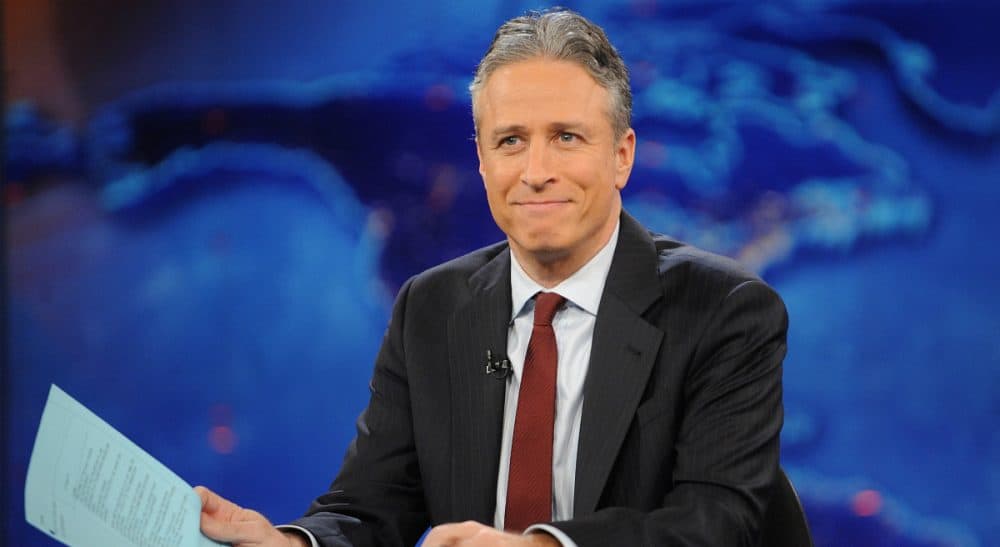Advertisement
The Comedy Legacy Of Jon Stewart, And The Bite We'll Miss

Jon Stewart is ending his tenure on "The Daily Show," the Comedy Central hit he has anchored since 1999. Perhaps with his departure, news will again get serious.
Though I certainly hope not. These days, a glance at the headlines of the world brings to mind the words Lincoln said during the darkest days of the Civil War: “I laugh because I must not cry.”
...making light of the day’s headlines has long been serious business. Stewart just happened to do it better than just about anyone.
What Stewart and his writers on "The Daily Show" do is not new. From The Great Moon Hoax of 1835, a New York newspaper's satire, taken for truth, about the discovery of life on the moon; to H.L. Mencken’s pointed — and hilarious — screeds; to Hunter S. Thompson’s lampooning of villainous pols; to the fake news of The Onion; to late-night monologues and network shows like "Laugh-In," "Not Necessarily the News" and the Weekend Update portion of "Saturday Night Live," making light of the day’s headlines has long been serious business. Stewart just happened to do it better than just about anyone. And he did it better because he meant it.
“Good satire comes from anger. It comes from a sense of injustice, that there are wrongs in the world that need to be fixed,” wrote columnist and author Carl Hiaasen. Night after night, Stewart tapped his anger at the way the world works and at those who do their best to short circuit real progress and an even playing field. His anger — righteous, moral, though rarely overt — has been the key to Stewart’s success. He has been our generation’s Howard Beale, mad as hell, but well aware that we’ll all have to continue taking it. And, man, this bugged the bejesus out of him. But instead of shouting out the window, as Beale does in the 1976 film "Network," Stewart called the bad guys out on national television and used a razor wit to tar and feather them before the jeering masses.
Agree with him or not, there’s no denying that Stewart has been a warrior in what he sees as the good fight, deploying words and humor as his weapons. Sure, a negative editorial in the The New York Times hurts, but nothing stings like a Stewart takedown.
Did Stewart sometimes go too far? Sure. Witness his crack, in 2009, that President Truman was a war criminal for using the atom bomb in 1945. He apologized for saying so during the next broadcast. And he could badger guests — knuckleheads and otherwise — and come off as a tad superior. It wasn’t always easy watching the smartest guy in the room prove it by being a bully.
More times than not, however, his intellect, humor and sense of what’s right and fair carried the day. There’s a reason no less a partisan than U.S. Sen. John McCain called him “a modern-day Will Rogers and Mark Twain.”
At his best, Stewart did more than skewer and ridicule the phonies, hypocrites, fools and crooks of our time. Often, he asked the tough and insightful questions members of the Washington press corps didn’t. His interviews with world leaders often yielded better and more definitive answers than those conducted by so-called real journalists. No wonder so many got their news from "The Daily Show."
Advertisement
Agree with him or not, there’s no denying that Stewart has been a warrior in what he sees as the good fight.
I will miss Jon Stewart. John Oliver's "Last Week Tonight" softens the blow. So does having another Stewart protégé, Stephen Colbert, in David Letterman’s chair. With them, Stewart's comedy legacy is safe. Both are angry young men in the best sense.
Perhaps this is the perfect time for Stewart to depart. The world may have arrived at the place predicted by Art Buchwald in an interview with The New York Times Book Review in 1985: “You can’t make up anything anymore. The world itself is a satire. All you’re doing is recording it.”
If so, let’s thank Jon Stewart for keeping us sane this far into the journey.

